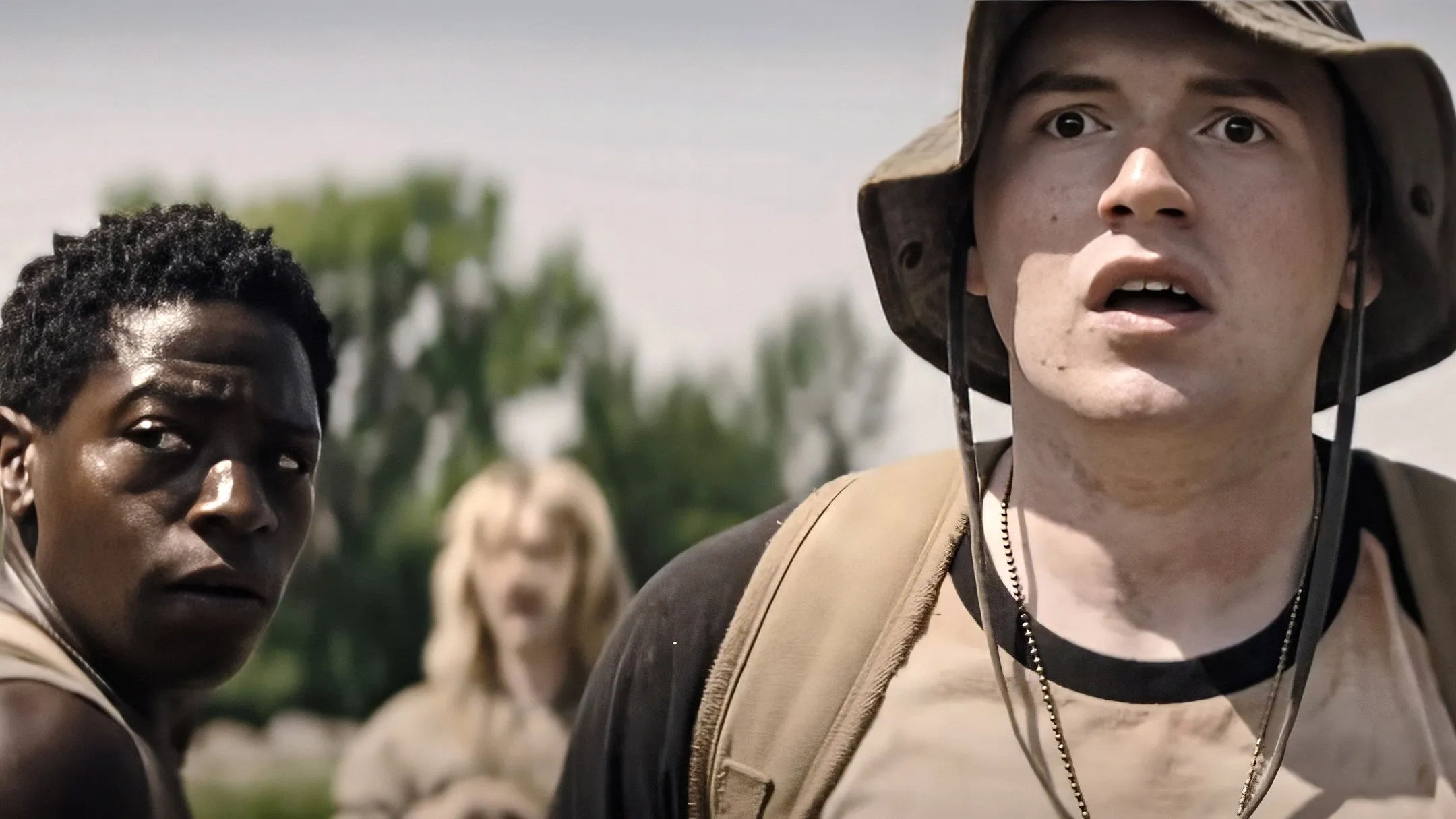By Zach Dionne
Copyright gq

The Long Walk follows a bunch of boys on a winner-takes-all endurance challenge where moving too slow gets you a bullet in the head. The Running Man, also dystopically gamified, ends with a variation on history’s most infamous terrorist attack, written decades beforehand. These 1979 and ’82 books are the next Stephen King movies in theaters. King first published both of them under a pseudonym, masking as a malevolent, Steve-shaped phantom named Richard Bachman. And the now-77-year-old author’s long-retired alter ego couldn’t have picked a better year to rise from the dead.
2025 was always bound to be big for King onscreen. Osgood Perkins’ The Monkey—an adaptation of a short story first published in the skin mag Gallery in 1980—dropped in February like a bloody appetizer, with the tagline “Everybody dies. And that’s fucked up.” Reigning King adapter Mike Flanagan returned in June with The Life of Chuck (the Haunting of Hill House visionary’s third King feature following Gerald’s Game and the Shining sequel Doctor Sleep). Chuck bagged a People’s Choice award at the 2024 Toronto International Film Festival and was hyped as a transcendent work that could sidle up next to The Shawshank Redemption, Stand by Me, and The Green Mile on the prestige podium. All three were name-checked in trailers promising an experience “from the mind of Stephen King and the heart and soul of Mike Flanagan.”
The Life of Chuck is indeed profound and excellently made. It’s also a tricky bit of business—in how it unfolds, how it uses its starry, Tom Hiddleston-led cast, and how it communicated to prospective viewers what it was up to. It struggled to find a theatrical viewership beyond hardcore Flanafans and the cohort King affectionately calls his Constant Readers, scraping together a slim $6.7 million at the domestic box office and $16.2M globally. The fully independent production did secure distribution through Neon (which also handled The Monkey) but only played on a thousand screens for a couple weeks before having its showings cut in half, then in half again.
Despite strong critical consensus—one promo harvested two dozen superlatives including “masterpiece” and “miraculous”—The Life of Chuck wasn’t a balm for all souls. “This is the sort of uplifting parable about elevating the everyman that makes you leave the theater angry at being so gracelessly manipulated and jerked around,” seethed Rolling Stone’s David Fear, taking aim at the way Chuck “wants you to feel the sheer wonder of being alive, and [is] willing to beat this beatific idea into you over and over again just to ensure you get the emotional gist of it.”
The Monkey, meanwhile, was a Final Destination-ish parade of creative kills, a gore-drenched flick where the insanity of the death toll becomes grimly hilarious. The Theo James vehicle made a decent $68.9 million worldwide, with $39.7M stateside. Flanagan’s got an instant cult classic with The Life of Chuck, but audiences didn’t show up the way they did for Oz Perkins’ mean, low-calorie, high-splatter romp. Everybody dies, and that’s fucked up nailed the national mood better than Chuck’s tag line: Every life is a universe all its own. Which, if nothing else, bodes well for the two bleaker-than-bleak King adaptations hitting the screen before the end of this packed year—The Long Walk, in theaters Friday, and The Running Man, which opens November 14th.
As it happens, both films are based on novels King originally published under the pen name Richard Bachman. King initially concocted Bachman because his publishers were reluctant to keep up with his coked-out pace and publish multiple titles a year. At first, King wrote years later in an essay reflecting on the Bachman era, “Dicky” merely offered him “a sheltered place where I could publish a few early books which I felt readers might like.” But he also acknowledged that the mystery man became “a kind of id for me; he said the things I couldn’t.” The first Bachman outing, 1977’s Rage, centers on a school shooter, years before violent death in educational settings became a depressing commonplace in American life. After the 1997 Heath High School shooting in Paducah, Kentucky, King asked his publisher to “take the damned thing out of print.”
Even Bachman’s fictional life was harsh. He’d served in the Coast Guard and the Merchant Marines and later lost a son, aged six, to drowning. His oeuvre, King wrote, came from “a place in most of us where rain is pretty much constant, the shadows are always long, and the woods are full of monsters.” In 1985’s Thinner, King’s fifth Bachman novel, a lawyer escapes justice after accidentally killing a Romani woman with his car, and her father curses him to waste away; after it was published, a bookseller who was also a keen King reader put two and two together, and King unmasked in an interview with the Washington Post. Misery, originally in contention to be Bachman’s sixth novel, became the next Stephen King book instead. He later wrote that Bachman passed away due to “cancer of the pseudonym,” although a couple “lost” Bachman works have surfaced in the ensuing years.
Bachman’s blisteringly cruel The Long Walk was actually King’s very first novel—although it wasn’t published until 1979, he finished it in 1966, when “Vietnam was chewing up our kids pretty bad.” For decades, even as film and television stripmined the rest of King’s catalog, it’s been seen as untouchable, although George A. Romero and King-whisperer Frank Darabont both tried to get adaptations off the ground. The version hitting theaters this week stars Cooper Hoffman and David Jonsson (spoiler alert: they’re magnificent). It was directed by Francis Lawrence, who’s honed a cinematic eye for kids being killed for televised sport across four Hunger Games movies. It’ll even turn Luke Skywalker evil, with Mark Hamill (also a Life of Chuck player) portraying a uniquely despicable villain never without his aviators. With The Long Walk, there’s no chance at a happy ending, only the least unhappy one.
Based on the trailer and director Edgar Wright’s résumé, The Running Man may give us a slightly zanier spin on a story whose Bachman-book iteration is nearly as desolate as Walk. (King once flexed that the whole novel was “written during a period of seventy-two hours and published with virtually no changes.”) Wright’s movie, starring Glen Powell, will be the second big-screen Running Man adaptation. Its predecessor, from 1987, was a fully batshit Arnold Schwarzenegger experiment featuring a cornucopia of gruesome one-liners and costuming choices, as well as an upbeat ending that King reportedly disliked. He once called the book’s finale “the Richard Bachman version of a happy ending”; without giving away too much, restoring the original conclusion will take some cojones on Wright’s part, even 24 years after 9/11.
King/Bachman’s The Running Man was set, prophetically, amid “the decaying reek of this brave year 2025.” In the mid-eighties, the idea of America as a life-devaluing dystopia still seemed fanciful; Wright’s Running Man and Lawrence’s Long Walk will require less suspension of disbelief. We made it through a global pandemic and came out broken, perhaps permanently. As of August’s end, 44 school shootings have transpired this year in the U.S., leaving 18 dead and, per CNN, at least 74 injured. The Gun Violence Archive had tallied 301 mass shootings through Sept. 11. The second Trump administration is rabidly working to limit, ban, and all-out criminalize: women’s reproductive rights; gender-affirming care for kids; diversity, equity, and inclusion programs; vaccines and other basic healthcare; the fight against climate change; queerness writ large; systems aiding vulnerable, oppressed populations. ICE is running rampant and fascism is in. And the only thing both sides of the spectrum seem able to agree on regarding the killing of Charlie Kirk is that more political violence is inevitable.
We’re about to find out how appealing (or appalling) audiences find one movie full of unarmed young men being gunned down and another where the whole country roots for the murder of a desperate dad on the run. Wright and Lawrence can’t have fully anticipated the ultimate American hellscape that would greet their movies on arrival, but Hollywood has a way of reflecting and refracting our national state of mind, sometimes accidentally and sometimes deliberately. King’s own work suits this moment, too—this year’s two big King TV shows, MGM+’s just-renewed The Institute and HBO’s forthcoming It prequel Welcome to Derry, are built around children being abducted and devoured by monstrous entities. Even Mike Flanagan’s going straight back to horror, rebooting Carrie as a limited series. But are we down so bad that the twisted mind of Stephen King simply won’t do anymore? Is Richard Bachman the only man for this bleak moment? King titled last year’s short story collection You Like It Darker. Now The Long Walk and The Running Man will show us if he’s right.



